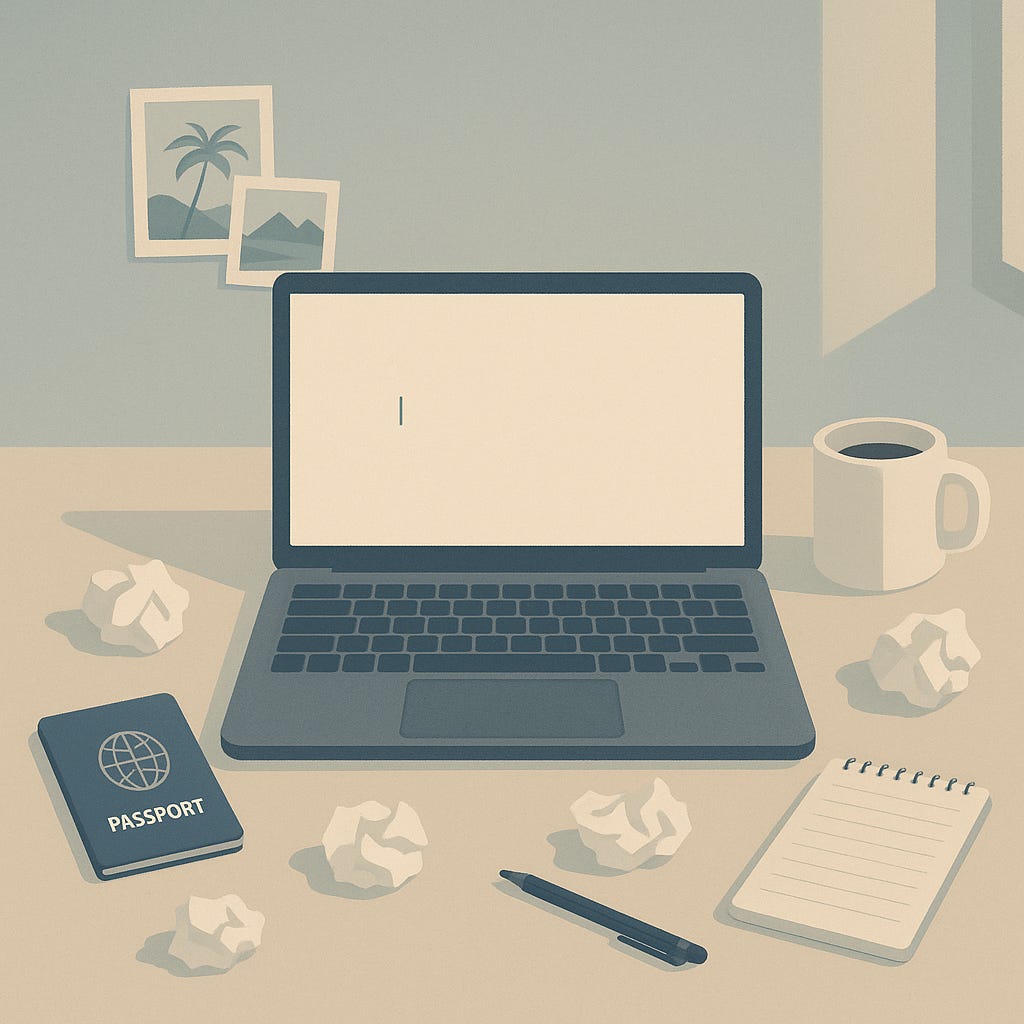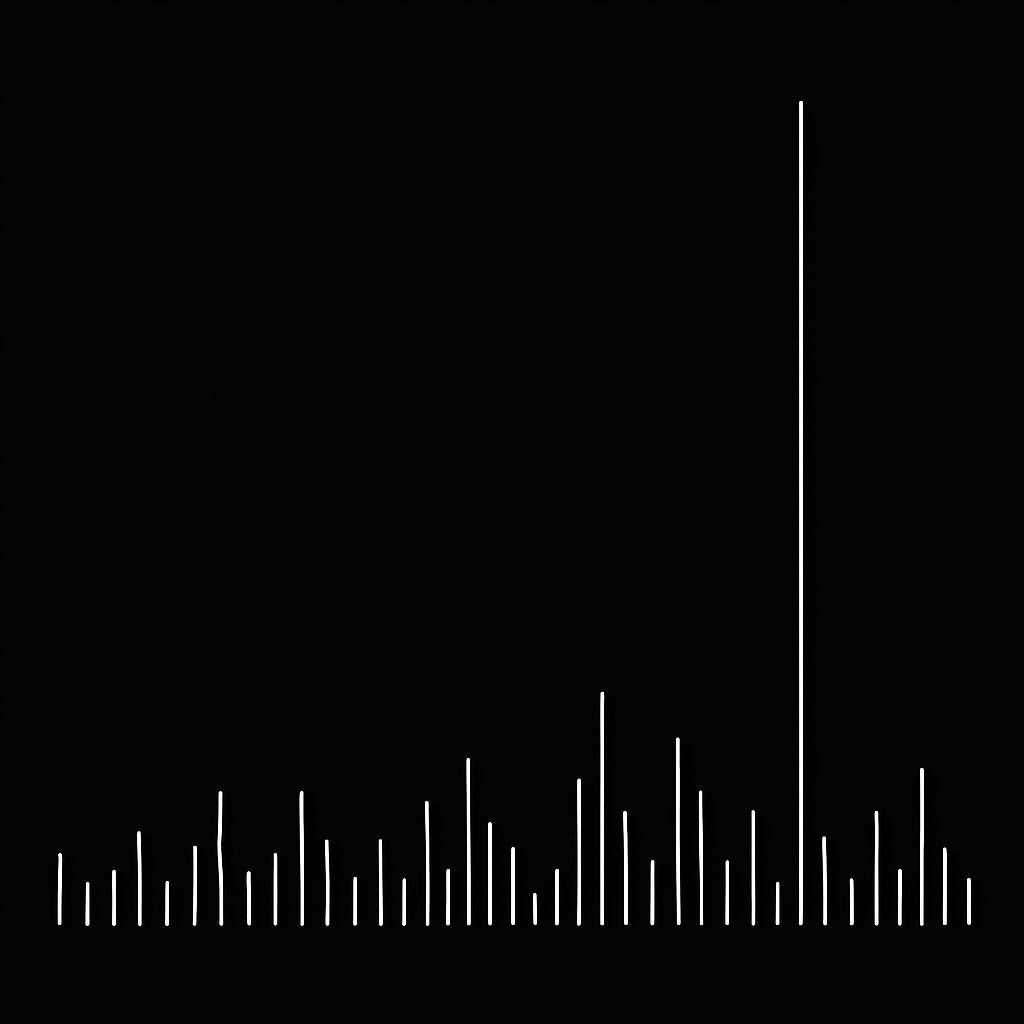I've been staring at a blank document for eight days now.
The cursor blinks mockingly at me, counting the seconds of my creative paralysis. I started this Substack with a goal—write a worthwhile article every two weeks that provides genuine value to readers like you. But here I am, cycling through idea after idea, each one feeling superficial, each potential topic dissolving the moment I try to grasp it.
The internal dialogue has become painfully familiar: This isn't good enough. This doesn't have a clear takeaway. Who am I to write about this? The frustration built with each passing day, compounded by the awareness that I'm falling behind my own standards. I've written before about health and wellness, decision-making frameworks and personal growth principles, but now those very topics feel distant. How can I write about moving forward when I'm clearly stuck?
Then it hits me—maybe being stuck IS the story.
The Conscious Reset
Let me rewind to where this began. A week ago, I returned from a trip with friends I rarely see anymore. Before leaving, I made a deliberate choice: I would fully disconnect from work, emails, and writing unless something was absolutely urgent. This wasn't procrastination or avoidance—it was a conscious trade-off.
I believe that when you're on a reset, it makes sense to fully reset. Half-measures don't work. You can't truly recharge while keeping one foot in your work world. So I embraced being completely present with the people I was with and the experiences we were sharing.
During one evening conversation, as I started mentally cataloging everything I'd need to tackle when I returned, one of my friends interrupted me. "You're here," he said simply. "Enjoy the presence." Then he mentioned a book he'd given me —Ikigai—and how to focus on single-tasking and being fully engaged in whatever you're doing in the moment.
That resonated deeply. I'd read Ikigai a couple of years back, and one of its most profound takeaways for me was exactly this: being fully present in what you're doing in the moment. It's not that multitasking is inherently bad—in daily life, it's often necessary. But whatever task you're engaged in at any given point, give it your 100% attention and effort.
So I did. I gave that week my complete attention. I was fully present with friends, fully engaged in conversations, fully immersed in experiences without the mental background noise of work obligations.
The Jarring Return
Coming back was like switching from a warm, natural conversation to trying to perform on command under bright lights.
During the trip, presence felt effortless. Ideas flowed naturally in conversations. Insights emerged organically from shared experiences. But sitting at my computer, trying to manufacture that same quality of thought and engagement, felt forced and hollow.
There was something profoundly different between being in the moment with people and trying to create meaningful content in isolation. The very reset that had recharged me mentally had also disconnected me from my usual sources of inspiration—the daily patterns, conversations, and small observations that typically fuel my writing.
I found myself in a strange paradox: I had returned more mentally clear and energized than before, yet completely unable to channel that clarity into words that felt valuable.
The 1/100 Principle
This is where Naval Ravikant's wisdom became crucial. Naval often speaks about how you can't know the 1% that works until you look at the entire 100% as a whole. It could be the 13th attempt, the 57th attempt, or the 99th attempt that finally breaks through. The key insight is that mistakes and failures are often only fully understood in hindsight.
You don't know which effort will be the one that matters. That article you struggle to write might be exactly what someone needs to read. That creative block you're experiencing might be teaching you something essential about your process. The attempt that feels like failure might be the foundation for future success.
This principle extends far beyond writing. In any endeavor, professional challenge, or personal growth journey, we're constantly making attempts without knowing which ones will prove valuable. The entrepreneur doesn't know which iteration of their product will find market fit. The artist doesn't know which piece will resonate. The person working on themselves doesn't know which habit change will be the catalyst for transformation.
But here's what Naval's framework taught me in this moment: the not knowing is exactly why you have to keep going. Everything makes sense in hindsight.
The Meta-Realization
Somewhere between day seven and eight of staring at that blank document, something shifted. I remembered all the books I'd read, podcasts I'd heard, and conversations I'd had about what to do when you're stuck. The message was remarkably consistent across founder stories, creative professionals, and personal development experts: you just have to find a way to move forward.
The method doesn't matter as much as the movement. Speak to people. Read something. Listen to different perspectives. There will be cues that help you figure out how to proceed. What drives that inspiration is deeply personal—everyone has something that pushes them forward—but the principle is universal.
That's when I realized I was holding the answer in my hands. This struggle, this period of feeling disconnected from meaningful topics, this very experience of being stuck—it wasn't separate from my writing. It WAS my writing.
Writer's block isn't a new concept. It's been named and studied for as long as people have been trying to create. But in that moment, I understood something deeper: the block itself was teaching me about the very principles I write about. Presence. Persistence. The value of forward movement even when you can't see the destination clearly.
The Universal Lesson
Here's what I want you to take away from this: when you're stuck—whether in writing, work, relationships, or any area of life—the key is to quickly recognize that state and shift your mindset toward movement.
It's okay to be stuck. It's part of the process. But staying stuck is a choice.
The shift isn't about forcing breakthrough moments or manufacturing inspiration. It's about changing your relationship with being stuck. Instead of seeing it as failure or evidence that you're not capable, see it as information. What is this stuck period teaching you? What assumptions is it challenging? What new approaches might it be pointing you toward?
Sometimes the way forward means writing about writer's block when you can't think of anything else to write about. Sometimes it means having an honest conversation with a friend who reminds you to be present. Sometimes it means trusting that this attempt—even if it doesn't feel like your best work—is part of the larger journey toward something meaningful.
The goal isn't to eliminate stuck periods from your life. The goal is to develop the mindset and tools to move through them with grace and purpose. To see them not as dead ends, but as redirections toward something you hadn't considered before.
Your next breakthrough might be hiding in your current struggle. You'll only know for certain when you look back. But the only way to get to that vantage point is to keep moving forward, one word, one attempt, one small step at a time.
Effort compounds over time. It may not make sense today, but as long as you're driving in the right long-term direction, you're building something valuable. The route might be longer than expected, or it might turn out to be a shortcut you never saw coming. Either way, the journey will teach you things you couldn't have learned any other way.
And sometimes, when you're brave enough to write about being stuck, you discover you weren't stuck at all—you were just preparing for the next chapter.





